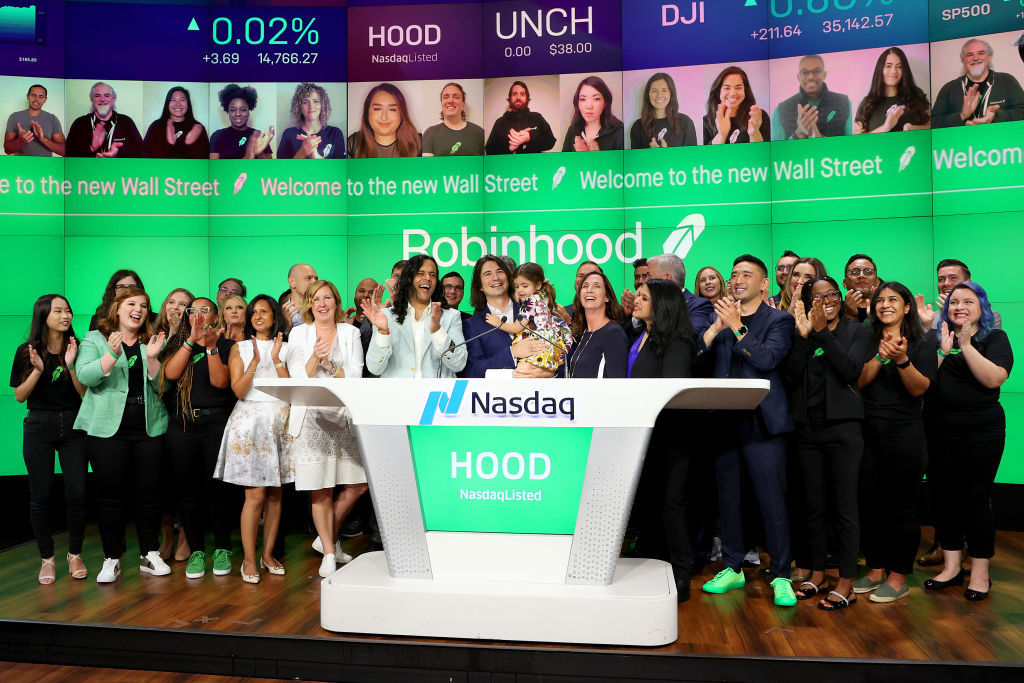1 'unusual feature' of Robinhood's IPO


A free daily email with the biggest news stories of the day – and the best features from TheWeek.com
You are now subscribed
Your newsletter sign-up was successful
Popular trading app Robinhood is expected to be "closely watched" during and following its Wall Street debut on Thursday, after an initial public offering at the "low end of the expected range" valued the company at $32 billion, CNN and CNBC report.
Much of the curiosity centers around an "unusual feature" of the company's IPO, namely that it "set aside up to 35% of shares for individual investors on its platform," which is a "huge chunk of stock that could fuel initial volatility," per CNN.
Usually, "up to 85 percent" of a company's IPO shares go toward hedge funds and money managers. But by offering a "sizable portion" of shares to customers at the IPO price, Robinhood is reportedly trying to (1) make its IPO more accessible "to retail investors and not just the financial elite," and (2) make good on its mission of "democratizing financial markets," writes CNN.
The Week
Escape your echo chamber. Get the facts behind the news, plus analysis from multiple perspectives.

Sign up for The Week's Free Newsletters
From our morning news briefing to a weekly Good News Newsletter, get the best of The Week delivered directly to your inbox.
From our morning news briefing to a weekly Good News Newsletter, get the best of The Week delivered directly to your inbox.
That said, the scale of such a "retail allocation" is reportedly creating "lots of uncertainty." "As I recall, there has not been a company doing what Robinhood is planning to do at the magnitude they're planning to do it," said R.A. Farrokhnia, a professor at Columbia Business School, adding that the company would find itself in "uncharted regulatory territory" should the process not go according to plan, reports CNN. IPO shares haven't been allocated to retail investors in "a big way," and many might opt to sell if the stock makes big moves early, creating turbulence.
If things do go well, Robinhood might build up goodwill with customers and positive publicity. But technical or other problems could cause issue for a company that has already "drawn regulatory and political scrutiny for a variety of business practices," reports CNN and Axios.
"Robinhood already has been in the hot seat," said Farrokhnia to CNN. "Can they afford this?" Read more at CNN.
A free daily email with the biggest news stories of the day – and the best features from TheWeek.com
Brigid Kennedy worked at The Week from 2021 to 2023 as a staff writer, junior editor and then story editor, with an interest in U.S. politics, the economy and the music industry.
-
 The environmental cost of GLP-1s
The environmental cost of GLP-1sThe explainer Producing the drugs is a dirty process
-
 Greenland’s capital becomes ground zero for the country’s diplomatic straits
Greenland’s capital becomes ground zero for the country’s diplomatic straitsIN THE SPOTLIGHT A flurry of new consular activity in Nuuk shows how important Greenland has become to Europeans’ anxiety about American imperialism
-
 ‘This is something that happens all too often’
‘This is something that happens all too often’Instant Opinion Opinion, comment and editorials of the day
-
 TikTok secures deal to remain in US
TikTok secures deal to remain in USSpeed Read ByteDance will form a US version of the popular video-sharing platform
-
 Unemployment rate ticks up amid fall job losses
Unemployment rate ticks up amid fall job lossesSpeed Read Data released by the Commerce Department indicates ‘one of the weakest American labor markets in years’
-
 US mints final penny after 232-year run
US mints final penny after 232-year runSpeed Read Production of the one-cent coin has ended
-
 Warner Bros. explores sale amid Paramount bids
Warner Bros. explores sale amid Paramount bidsSpeed Read The media giant, home to HBO and DC Studios, has received interest from multiple buying parties
-
 Gold tops $4K per ounce, signaling financial unease
Gold tops $4K per ounce, signaling financial uneaseSpeed Read Investors are worried about President Donald Trump’s trade war
-
 Electronic Arts to go private in record $55B deal
Electronic Arts to go private in record $55B dealspeed read The video game giant is behind ‘The Sims’ and ‘Madden NFL’
-
 New York court tosses Trump's $500M fraud fine
New York court tosses Trump's $500M fraud fineSpeed Read A divided appeals court threw out a hefty penalty against President Trump for fraudulently inflating his wealth
-
 Trump said to seek government stake in Intel
Trump said to seek government stake in IntelSpeed Read The president and Intel CEO Lip-Bu Tan reportedly discussed the proposal at a recent meeting
